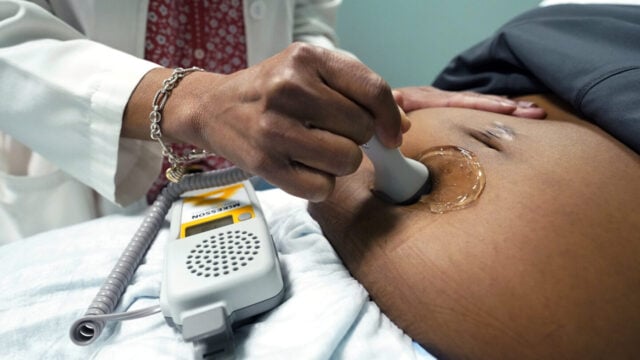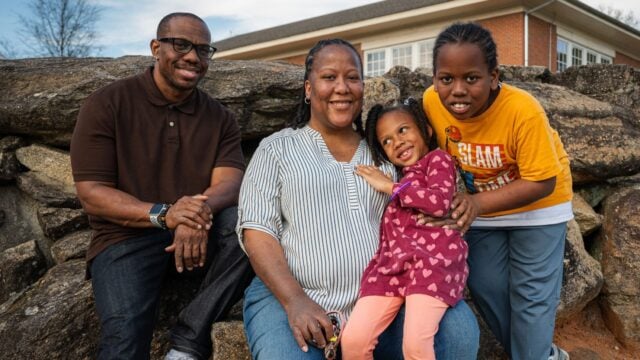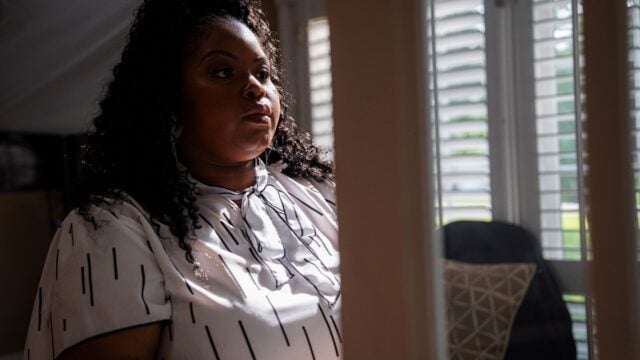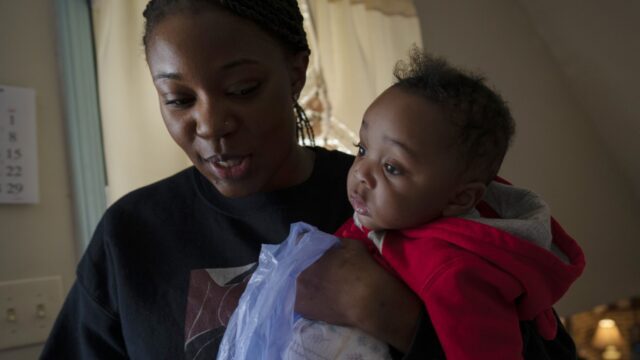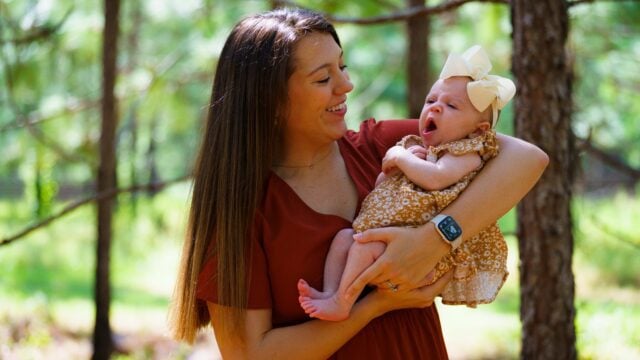Seven years ago, Heather Dobbs was preparing for the birth of her second baby. She and her husband, who live in Covington, were thrilled to be welcoming another child into their family.
With her first, she ended up having an emergency cesarean section. So, this time her doctor recommended planning a C-section.
“My OB-GYN said since you had complications the first time, we’ll schedule one. And then that way, we can have a safe birth. You can be in and out. You can even pick the date,” Dobbs said. “So I’m thinking this is going to go very smoothly.”
And things at the hospital did go smoothly — at first.
Doctors delivered the baby, a healthy baby girl Dobbs and her husband named Claire.
But suddenly, Dobbs’ heart rate skyrocketed.
“And I could feel my heart beating in my chest, like, so hard. It just felt like it was going to beat out of my chest on its own,” she said. “And I remember asking the anesthesiologist if everything was OK, and he said, ‘Everything is fine. You just needed some fluid but everything’s OK now, we should have you off the table in a little bit.’ And then it happened again.”
Lying on the surgery table, Dobbs could see lights blinking on vital sign monitors and doctors and nurses running around.
“I knew something was wrong. And my final thought was, I haven’t held my baby, you haven’t even held your daughter. And then that’s when I blacked out.”
The commonality of ‘maternal near misses’
When Dobbs came to, she was in the ICU. Her mother and husband were in the room.
Doctors told her what happened.
“I had to have an emergency hysterectomy. My uterus would not contract and I was hemorrhaging and nearly hemorrhaged to death. So I also had a massive blood transfusion as well. And these interventions saved my life.”
Dobbs had survived what’s known as a maternal near miss.
Stories like hers are increasingly common.
Georgia has long had one of the highest rates of pregnancy-related death in the United States. And, for every person who dies, many more survive life-threatening complications.
One way researchers are trying to save more lives is by studying both individual maternal deaths and women’s experiences with a near miss.
“Because with a maternal death that’s all we have. We don’t really know all of the challenges that were occurring. And there is so much information with one story that you can gather. These are really critical moments that happen to a woman during childbirth,” said Dr. Natalie Hernandez-Green, an associate obstetrics and gynecology professor at Morehouse School of Medicine and director of the Morehouse School of Medicine Center for Maternal Health Equity.
“You walk in with this planned idea and you walk out with your life forever changed.”
Heather Dobbs
She’s spearheading a national Morehouse project to document the stories of Black women and other women of color — a group who face the highest risk for maternal mortality and morbidity.
“Centering and amplifying women’s lived experiences and acknowledging them as legitimate sources of data,” she said, “because the current data that we have has been more quantitative.”
So far, the Maternal Near Misses project has recorded around 90 stories in Georgia, New Jersey, Louisiana and the District of Columbia. This year, it’s expanding into Texas.
The project is also beginning to incorporate the near-miss accounts of physicians, nurses and other health care workers, and family members in the orbit of a maternal death.
Hernandez-Green said she hopes creating an archive of first-person stories can shed more light on a key question:
Why do so many women keep dying or almost dying from mostly preventable conditions?
It’s a question researchers are trying to answer around the nation at a time when U.S. maternal mortality rates continue to outpace those of other high-income countries.
Georgia committee investigates maternal deaths
In Georgia, the Department of Public Health has determined that 85% of pregnancy-related deaths could be avoided.
The causes of a pregnancy-related death are often complex.
They can include doctors or other health care workers missing critical maternal warning signs. A patient’s health before pregnancy also plays a big role.
Determining which deaths in the state can be counted as pregnancy-related is the job of the Georgia Maternal Mortality Review Committee.
The group includes dozens of physicians, nurses, epidemiologists and other specialists who investigate every single reported maternal death in Georgia that occurs within a year of pregnancy.
They pore over patient medical records, autopsies, police reports, social service records and any other available documents, and interview a patient’s family members.
“The committee asks, would she have died if she had not been pregnant? And, that guides whether the death was related to pregnancy or not,” said Katie Kopp, who directs maternal health programs at the Georgia Department of Public Health and manages the Maternal Mortality Review Committee.
The committee can spend several months on each investigation.
The goal is to piece together exactly what led to a woman’s death, and make recommendations to policymakers for ways to avoid similar issues and improve patient care.
“And put together a comprehensive story of what happened in that person’s life,” Kopp said.
The U.S. Centers for Disease Control and Prevention promotes committees like Georgia’s as one of the tactics for states to combat maternal mortality rates.
Georgia’s committee launched more than a decade ago.
The state has also implemented a number of policies designed to boost maternal health outcomes, including a recent expansion of postpartum Medicaid coverage up to a year after pregnancy, and a program offering women around the state perinatal mental health assistance.
Still, the state’s maternal health disparities persist.
Heather Dobbs said it’s critical to provide more support to women during and after pregnancy – especially for their mental health.
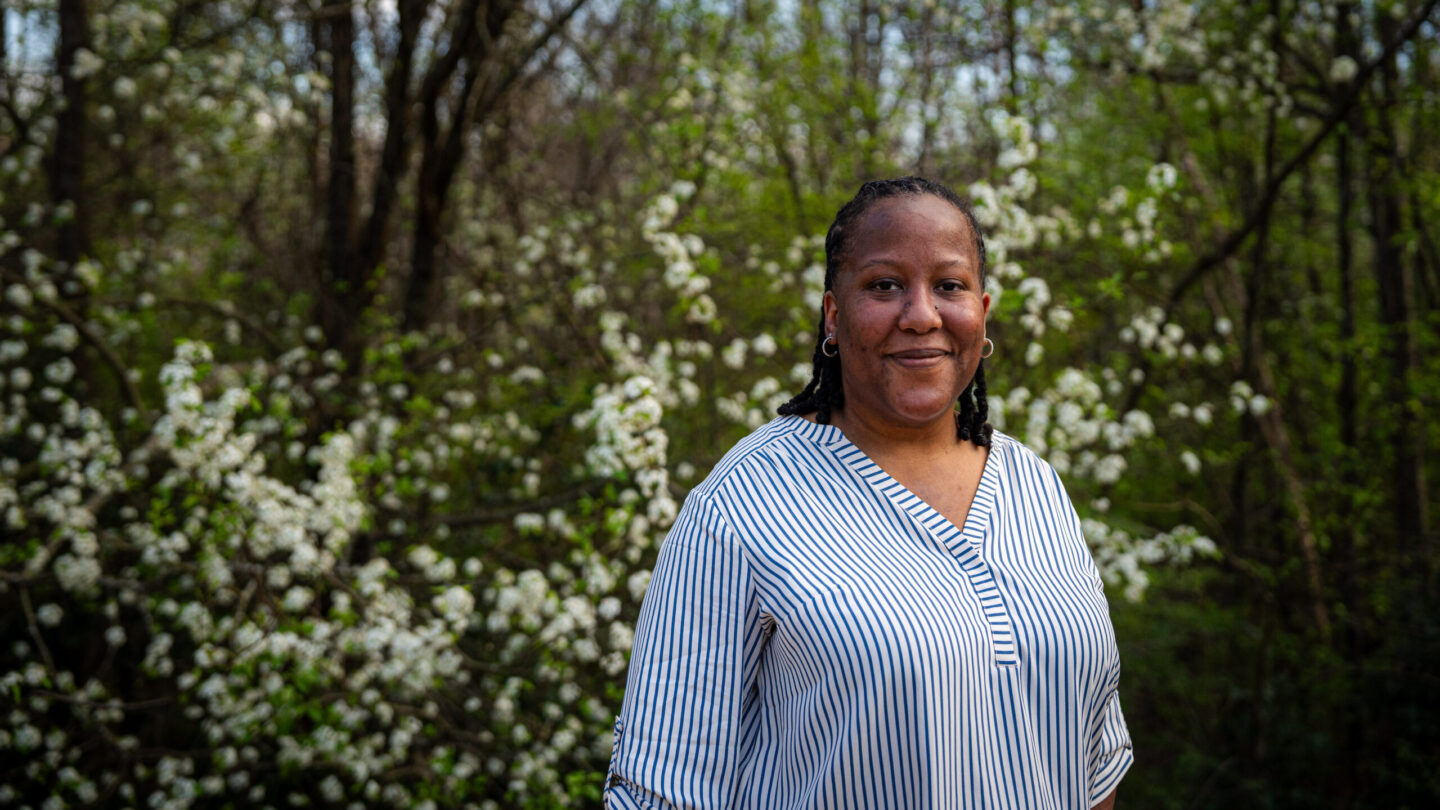
Seven years after her near miss, she still lives with trauma.
“It really took a toll on my mental health because I felt like in some way that I was the one that had failed. Like, you know, you have one job, your body is set up to do this. What in the world happened? You walk in with this planned idea and you walk out with your life forever changed.”
The experience left Dobbs and her husband with a new shared grief after losing the chance to have more children.
“Because we wanted to expand our family to have at least one more. And because of the hysterectomy that’s not something that’s ever going to happen for us. And so that was huge, too.”
Her experience motivated her.
Dobbs now works at Morehouse School of Medicine. And she’s certified as a doula to help others avoid what she went through, with care shown to reduce the risk of complications and maternal death.
—
This story is part of our series Missing Moms: Inside Georgia’s Maternal Health Crisis. Jess Mador’s reporting is part of a fellowship with the Association of Health Care Journalists supported by The Commonwealth Fund. It is produced in partnership with the Georgia Health Initiative.










